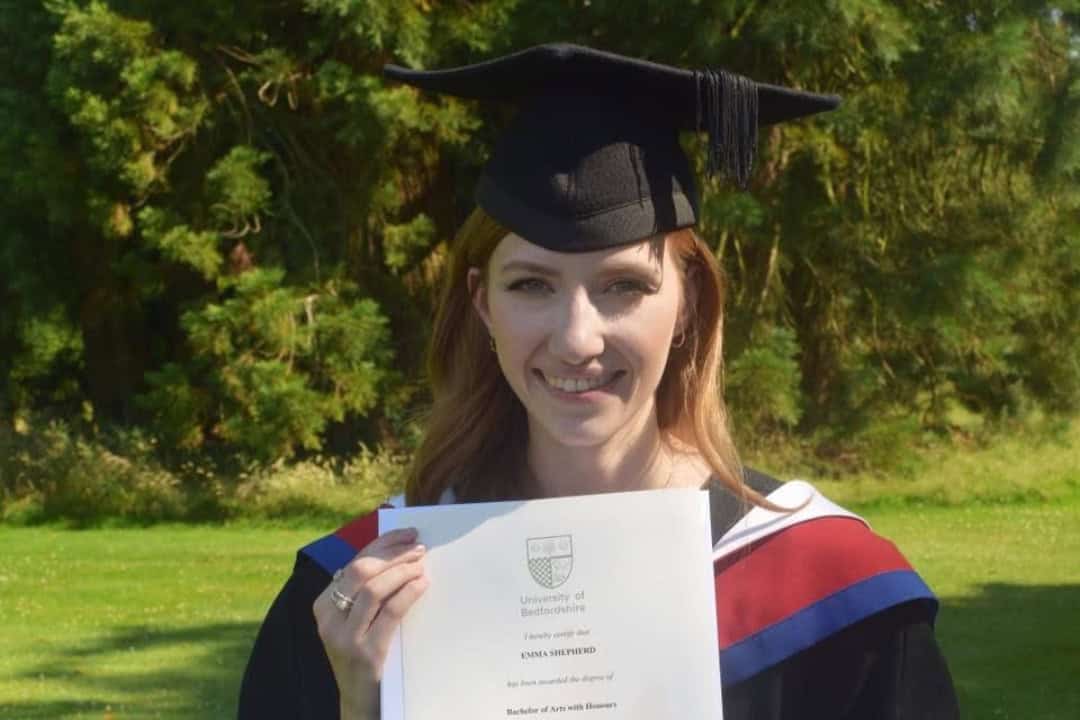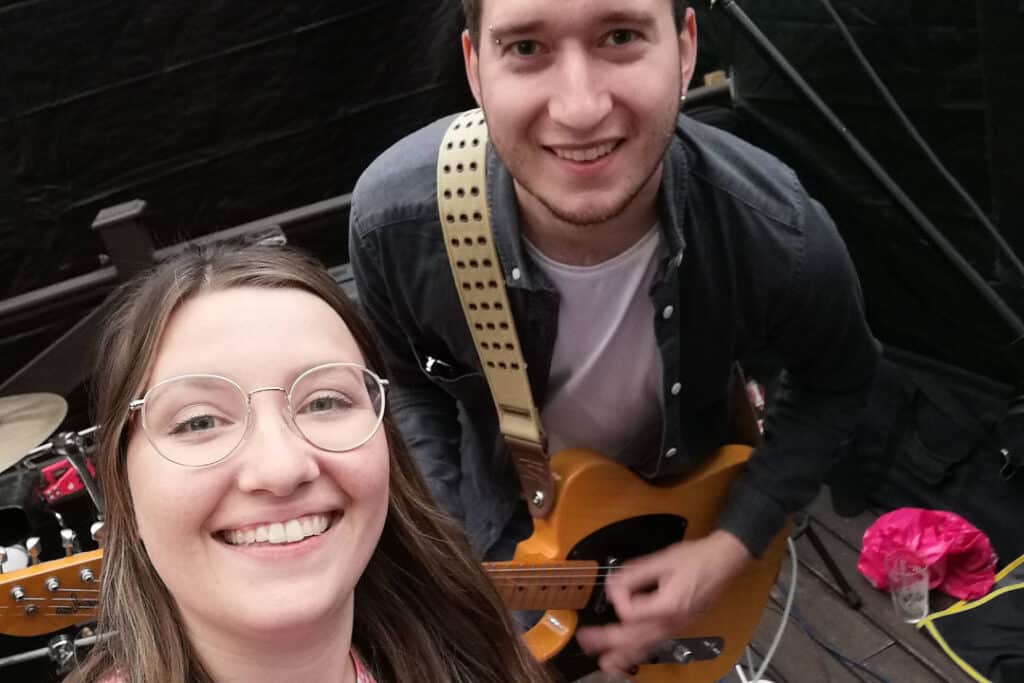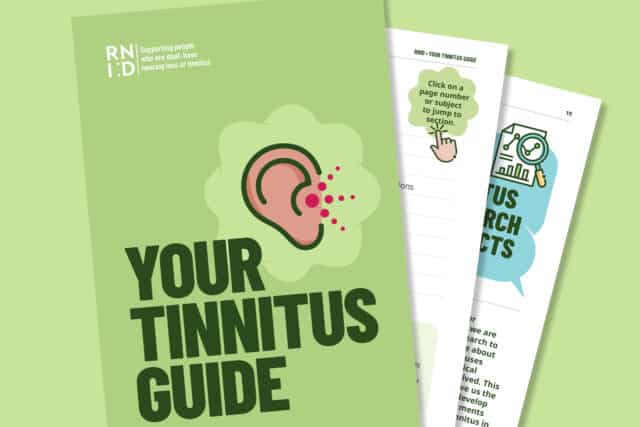
Emma, 31, lives in Buckinghamshire with her husband Joe and her cats, Twiggy and Ralph. When she’s not busy with her day job in marketing, she’s making videos for her social media, practising pole fitness and going to gigs.
Here Emma shares how a big night out at university left her with tinnitus and how she found her way through it.
Now, as new research shows over half of young adults report hearing problems after listening to music, Emma is sharing her story to raise awareness about tinnitus and the importance of protecting your hearing.
Freshers’ Week and ears ringing
I developed tinnitus when I was 18, during Freshers’ Week. It genuinely turned my life upside down and that’s why I’m sharing my story. I’m passionate about saving people from what I went through.
My first week at uni was incredibly hard. I was very homesick and anxious. But then I found people that I clicked with, and we all went out together for Freshers’ Week and had such a fun time. I’d get home with my ears ringing, but the next morning they’d be fine.
My ears had always rung after a night out. I think most people’s do. No one had ever taught me anything about tinnitus, so I didn’t know that it wasn’t ok. I was just an 18-year-old having a great time with my mates.
Too close to the speaker
One night out was very loud – we were up near the DJ. I remember my friend falling over next to a speaker and the rest of us trying to catch her. When I got home, my ears were ringing as usual. The next morning, the ringing was still there. I thought, ‘Oh, it’s only the next day. It’ll be fine.’
When the ringing was still there two days later, I started to panic. I went straight to Dr Google and read that tinnitus can be permanent, which made me panic even more. I saw the on-campus doctor, who gave me antibiotics for an ear infection. But the tinnitus didn’t stop.
Tinnitus 24/7
I carried on at uni for a couple of weeks, but it was really hard. I couldn’t concentrate on anything. I became an anxious wreck. Eventually I thought, ‘I can’t do this’. I dropped out and moved back home.
I tried to go back to my old life. Everything around me felt the same, but I’d changed. I was more anxious, trying to navigate living with tinnitus. It was on my mind 24/7.
Tuning out the tinnitus
I went to my GP, who referred me to an NHS audiologist. This was the start of my journey to feeling better. I was fitted with little devices that played a sound similar to my tinnitus, which is a buzzy, crackly, staticky kind of sound. This retrained my brain and helped me to tune the tinnitus out.
I wore the devices every day for about nine months. Then I wore them less and less until my tinnitus just wasn’t particularly bothersome anymore. I’d hear it at night before I went to sleep. But during the day, when I was hanging out with mates or doing whatever I was doing, it was manageable.
Cracking on with life
It was such a relief to feel normal again. My tinnitus was still there, but it wasn’t consuming me anymore. I went back to the job I’d had before uni, serving Butterbeer at Harry Potter Studios. This time round I met Joe, who’s now my husband. So as incredibly hard as everything had been, it felt like things happened the way they were meant to.
It turned out that Joe’s dad had tinnitus too, and he didn’t seem bothered by it. He was just cracking on – going to work, seeing his mates. Seeing that really helped me.
The following September, supported by Joe and our families, I felt strong enough to go back to uni. This time I went to one close to home so that I’d be able to cope better with anxiety and get to my support network easily. It turned out that I thrived at the new university and my tinnitus rarely affected me during my studies.
Earplugs every time (and proud of it)

Second time round at uni, I always wore earplugs on nights out. I was a bit worried about what people would think so I’d always wear my hair down. But I don’t think anyone ever commented – they were probably too drunk to notice!
I mostly used foam earplugs when I first got tinnitus, but now there are so many types out there. The ones I currently use look really cool and sleek, and they’re so comfortable that I forget I’m wearing them. I don’t wear my hair down to cover them now, as I’m proud to be looking after my ears.
Die-hard music fans might say earplugs affect your ability to enjoy music, but I disagree. My husband is lead guitarist in a rock band, so I’m at gigs a lot, listening to stuff like Prince and Thin Lizzy. I always wear my earplugs, and I always have a brilliant time. And I have spare foam ones in my bag to give out to friends.
People not protecting their hearing is one of my biggest frustrations. If I’m in a club, I’ll look at bar staff to see if they’re wearing earplugs – and they’re not. I’ll think, ‘But you work here! You’re here every night!’ It just blows my mind.
Blips, dips and birdsong
Over the next decade, I wasn’t really affected by my tinnitus. It had become so normal to me that it didn’t feel like an issue.
But over the last 18 months I’ve had problems with my eustachian tubes, so I’ve been more aware of my ears. I’ve also had lots of stress at work, which has led to a dip in my mood. As a result, I’m currently having a bit of a blip with my tinnitus.
These blips can happen and it’s about making sure you have the tools to manage them. I find that being kind to myself and keeping on with my normal life – like going to my pole fitness club, which I love – really helps.
My tinnitus is well masked by nature, so I try to go out for long walks every day, breathe in the fresh air and listen to the birds. I work from home and it’s really quiet, so I’ll often play Lofi music and Autonomous Sensory Meridian Response (ASMR) videos to keep me focused. In fact, ASMR videos have helped me so much that I’ve even made some of my own.
I think you have to make peace with tinnitus. If you resist it, you’ll struggle. If you just accept it, it makes everything that bit easier.
Wise words for Freshers’ Week
If I could go back in time and talk to the 18-year-old me starting university, I’d say, “Wear earplugs! You can still have fun. You can still enjoy the music, but you’ll enjoy it safely. And stay back from those speakers!” I’d also tell myself to take breaks – go outside, get some air, have a glass of water.
But if the tinnitus still had to happen, I’d tell myself, “It’ll be hard at first but you’ll find your way. You’ll get your degrees. You’ll get married, buy the house and have the job. You’ll be fine.”
